1. 2000-2022 Trailing 12 Month P/E Ratios
Back to 2002 Levels Coming Out of Internet Bubble

Gina Adams Bloomberg https://twitter.com/
2. SPDR Software ETF -41% Correction….Closed Below Long-Term Weekly Chart 200day Moving Average.
XSW closes below 200day
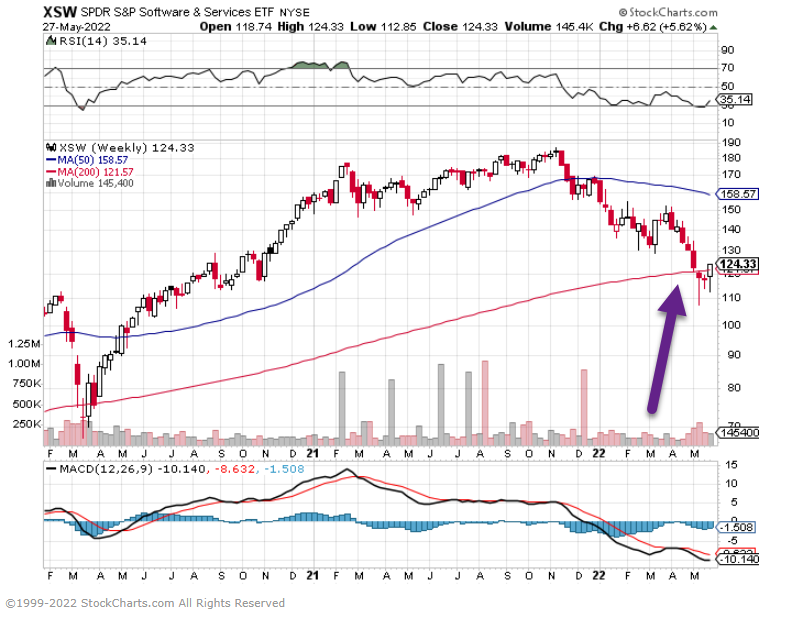
3. Regional Bank Index Sell-Off….Holds Support Going Back to Early 2021
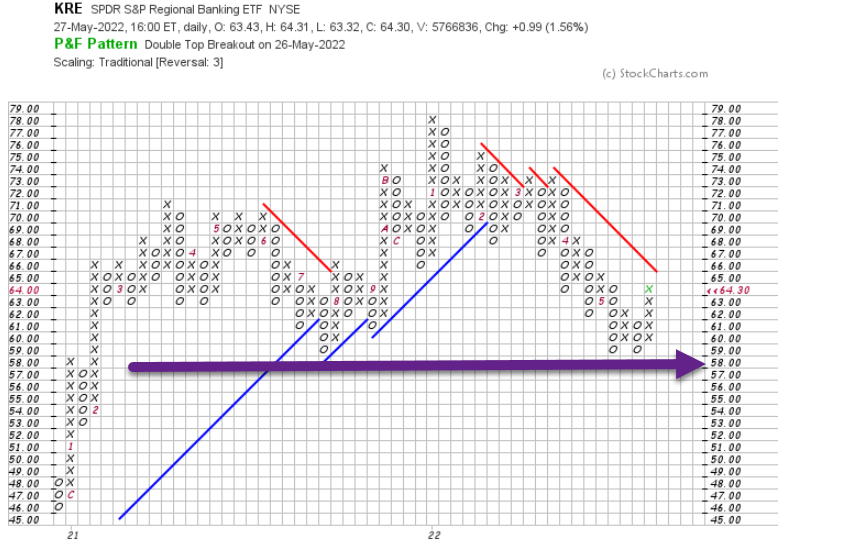
4. Energy Select ETF Another Break-Out to New Highs
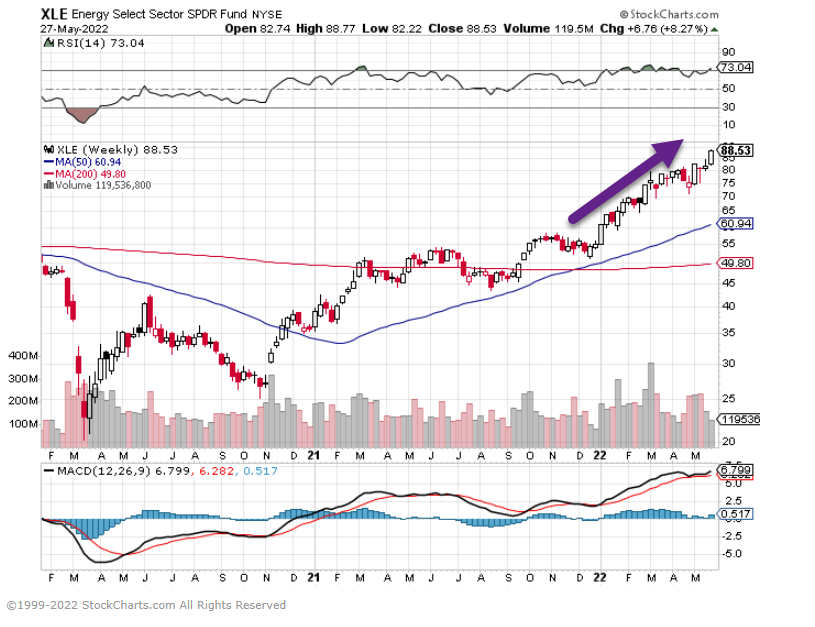
5. Number of Days that SPY Traded in Positive Territory All Day Plummets
Bespoke Investment Group All Day Rallies A Thing of the Past-It seems like a distant memory now, but Monday’s rally marked just the 13th time all year (and over the last 100 trading days) that the S&P 500 tracking ETF (SPY) opened higher and traded in positive territory all day (‘100% positive day’). The chart below shows the rolling 100-trading day total number of 100% positive days for SPY since 1994, shortly after the ETF launched. The current level of 13 is already well below the long-term average of 18, but last week, the reading was even lower at 12. The last time the 100-day rolling total was lower than that was in May 2009, and the lowest readings ever recorded were in periods beginning in October 2002 and September 2008 with just six in a 100-trading day span.
What makes the current period unique is how quickly the rate of 100% positive days has plummeted. 100 trading days ago, the rolling total was more than twice the current level at 29. Also, it was only in February 2021 (less than sixteen months ago) that the number of 100% positive days reached a record high of 33 on 2/4/21. That peak came just weeks before the Federal Government sent out the third and final round of stimulus checks. Just as massive amounts of fiscal and monetary stimulus helped to support markets during COVID, the withdrawal of these supports has introduced gravity back into the equation.
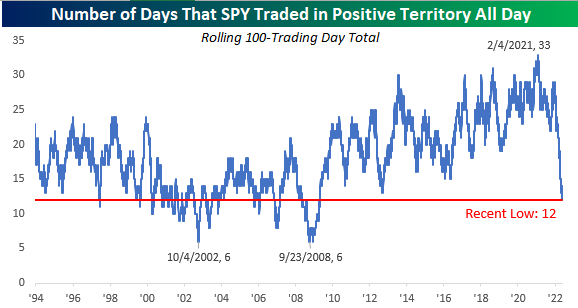
https://www.bespokepremium.com/interactive/posts/think-big-blog/all-day-rallies-thing-ofpast
6. Natural Gas Huge Run Up in Price but Still Well Below 2008 Levels
By Wolf Richter for WOLF STREET. And the fracking boom that caused prices to collapse in the US starting in 2009, while prices soared elsewhere, is now being leveraged to export LNG, and we already kissed those collapsed natural gas prices of $2-3 per million Btu goodbye.
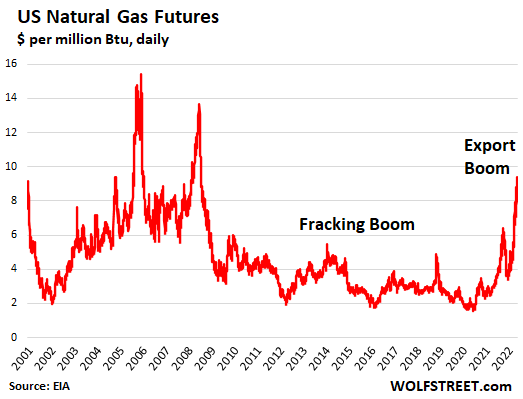
https://wolfstreet.com/2022/05/25/us-natural-gas-futures-spiked-to-highest-since-2008-tripled-in-a-year-why-we-kissed-that-dirt-cheap-natural-gas-goodbye/
7. Meanwhile, LNG exports are surging as U.S. inventories hold near the low end of the 5-year range.
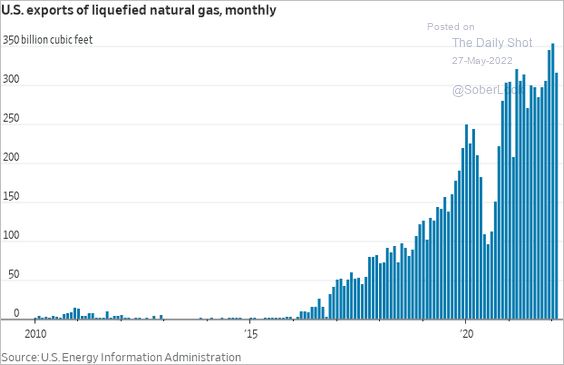
Source: @WSJ Read full article
The Daily Shot https://dailyshotbrief.com/
8. Personal Savings Rate Falls Back to 2008 Levels
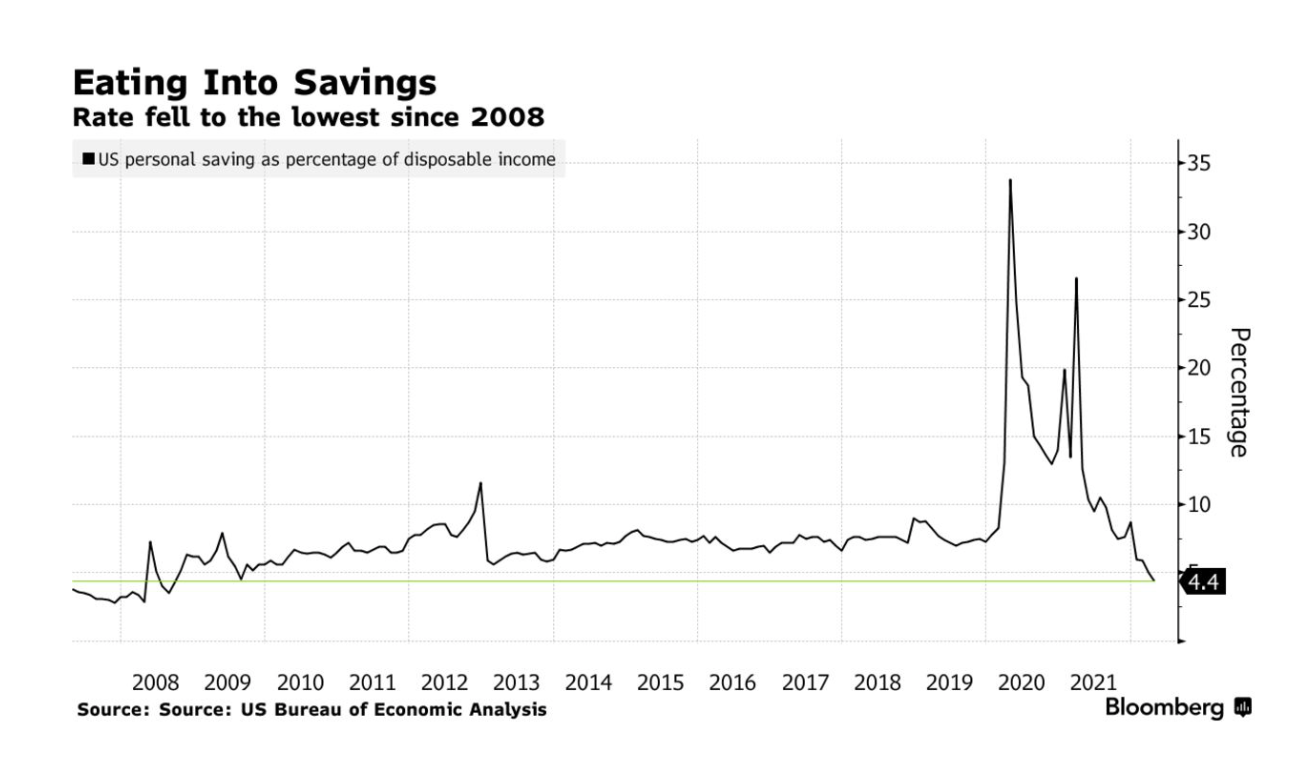
https://www.bloomberg.com/news/articles/2022-05-27/us-savings-rate-drops-to-lowest-since-2008-as-inflation-bites?srnd=premium&sref=GGda9y2L
9. College Enrollment Fell for 11th Year in a Row

685,000 fewer students were enrolled in post-secondary education in America this spring, a 4.1% fall on 2021, which itself was a 3.5% fall on the numbers from 2020 according to data out yesterday from the NSC Research Center. That fall marks the 11th straight year that the spring count of total enrollments has dropped in the US.
The college conundrum
The biggest drop came in undergraduates, as 662,000 fewer undergraduates enrolled — a 4.7% drop on the year before. Community college numbers fell almost 8%.
Part of that fall could be explained away by the pandemic, where remote-learning distinctly diminished the college experience, but the scale and consistency of the declines suggest something larger is at play: college is losing its allure.
Once the golden ticket to a middle class life, the rise in the cost of college has outstripped the rise in the cost of living many times over in the last 50 years, suggesting that the math of the college decision is, for some prospective students, not adding up anymore.
Interestingly, the most well-known institutions are bucking this trend. The acceptance rate at Harvard plunged to an all-time low (~3%). The same happened at Stanford… and Yale… and Brown… and Columbia (to name but a few). The college path might not make quite as much sense for everyone as it used to, but the big name institutions aren’t the ones losing out.
10. Three flavors of a good life: Happy, Meaningful, Psychologically Rich
Psychology Today Marianna Pogosyan Ph.D. As a distinct, yet corelated dimension of a good life, the psychologically rich life differs from the existing hedonic-eudaimonic dichotomy in a number of ways. For example, if the emphasis of a happy life is on positive emotions and security, and the emphasis of a meaningful life is on purpose and coherence, then the hallmarks of a psychologically rich life are variety, interest and perspective (Oishi & Westgate, 2021). If a positive mindset facilitates a happy life, and moral principles facilitate a meaningful life, then curiosity and spontaneity will facilitate a psychologically rich life. If the outcome of a happy life is personal satisfaction and the outcome of a meaningful life is societal contribution, then the outcome of a psychologically rich life, according to Oishi, is wisdom.
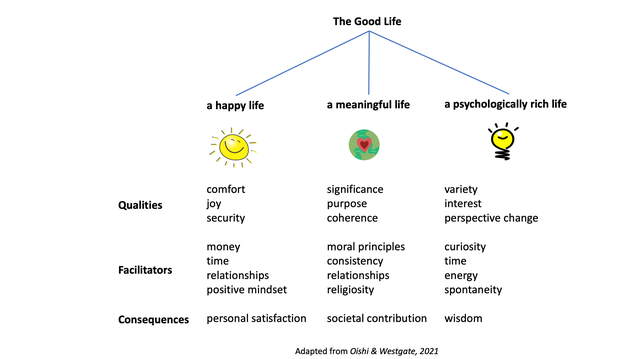
To explore the three constructs of well-being differently, consider the metaphor of a beautiful garden. You might feel hedonic well-being whenever you are greeted by the lovely blooms as you stroll through your garden. You might experience eudaimonic well-being as you revel in the sense of purpose you receive from tending to your garden and sharing its gifts with others. According to Oishi, psychological richness arises as your garden undergoes seasonal changes. The landscape of the garden is in a constant flux. Its diverse inhabitants from the plant and animal kingdoms follow the Nature’s lead. As you watch your garden metamorphose through the seasons – aflush with color and harvest in one, barren and dormant in another – you might recognize the wealth, wonder and wisdom of life’s unfolding, to which you also belong.
article continues after advertisement
Here are 6 questions on the psychologically-rich life with Dr. Oishi.
What does a psychologically rich life look like?
A psychologically rich life is a life of curiosity and exploration. It’s not that you have to chase after new and exciting experiences all the time. Rather, it’s an invitation to remain curious about life in its fullness, and not limit yourself to the comforts of what you already know.
What is the mechanism that allows our experiences, at times even the challenging ones, to add up to a well-lived life?
Consider the differences between material wealth and psychological wealth. Material wealth, which can be money or other assets, is often tangible. For me, the psychological equivalent of material wealth are our stories. They might include our happy memories and the meaningful contributions we make to other people’s lives. But when it comes to psychological richness, sometimes even the difficult experiences that help us grow and see things in new ways can add to our wealth. That’s because those are often the experiences that we tend to with care and reflection, which then turn to insights and observations that we can carry with us and share with others.
Two people can have the same number of unusual experiences. For one person, these experiences will add up to bring about new insights and perspectives. For someone else, they will remain interesting, yet disparate events that don’t contribute to growth. In part, this discrepancy has to do with personality, value systems, and even mindset. For example, if someone wants to live an aesthetic life, then engaging with thought-provoking art can be transformative for them, compared to someone who isn’t interested in these values. It also matters how reflective the person is. Self-reflection might be what binds experiences together to make them count towards a well-lived life. When we deeply reflect on our experiences, the connections and insights that we gather can accumulate to make for a richer whole.
You argue that a psychologically rich life comprises of experiences in which novelty and complexity are followed by changes in perspective. Why is a change in perspective so important?
A change of perspective is precisely what captures some of the growth. For example, the reason why certain experiences such as study abroad programs can be so transformative, is because they often introduce us to new ways of thinking about life. In turn, we might become encouraged to engage with the novelty and complexity of the experience in ways that affect our understanding of the world and lead to growth.
article continues after advertisement
On the other hand, a person can go bungee-jumping for the sake of sensation seeking, and it might not change anything about the way they see life. Thus, change of perspective is an indication that we were able to digest the novelty, complexity and depth of the experience in new, insightful ways.
Can second-hand experiences, for example through literature and film, contribute to a psychologically rich life?
Great literature, poetry, film, music and art can significantly enrich our lives. I think humans created art and culture to essentially help themselves go through a wealth of experiences second-hand. As Marcel Proust wrote in In Search of Lost Time, a novel can help us experience the joys and sorrows of someone’s entire lifetime within a matter of hours. While first-hand experiences are obviously more real, sometimes the imaginary worlds that novelists craft can be as vivid.
How can we add psychological richness to our lives?
A good lesson can be found in studies about regret. According to research, short-term regret is usually about something you did, whereas long-term regret is about something you didn’t do. If you were to ask old people about their regrets, it often is about not having various experiences, not taking the job offer, not doing this or that. This mindset can help us be more willing to make changes.
What can research on psychological richness teach us about the good life?
Sometimes, people can be so obsessed with happiness, that they actively strive to stir their lives in one direction – that of positive emotions and comfort. But life is unpredictable, and unfortunately, not always pleasant. Psychological richness entails accepting life as it happens, in its entirety. If we consider stories that we accumulate and share with others as the currency of psychological richness, many of our experiences can lend new insights and propel us towards growth, thus adding up to wealth.
To me, this research diversifies the ways in which people could lead a good life. A happy life is a great life. A meaningful life is a great life. But at times, when happiness and meaning are hard to come by, or if you are not predisposed to them, you can still experience well-being and have a good, admirable life by leading a psychologically rich life.
Many thanks to Shige Oishi for his time and insights. Professor Oishi is a personality and social psychologist at the University of Virginia.